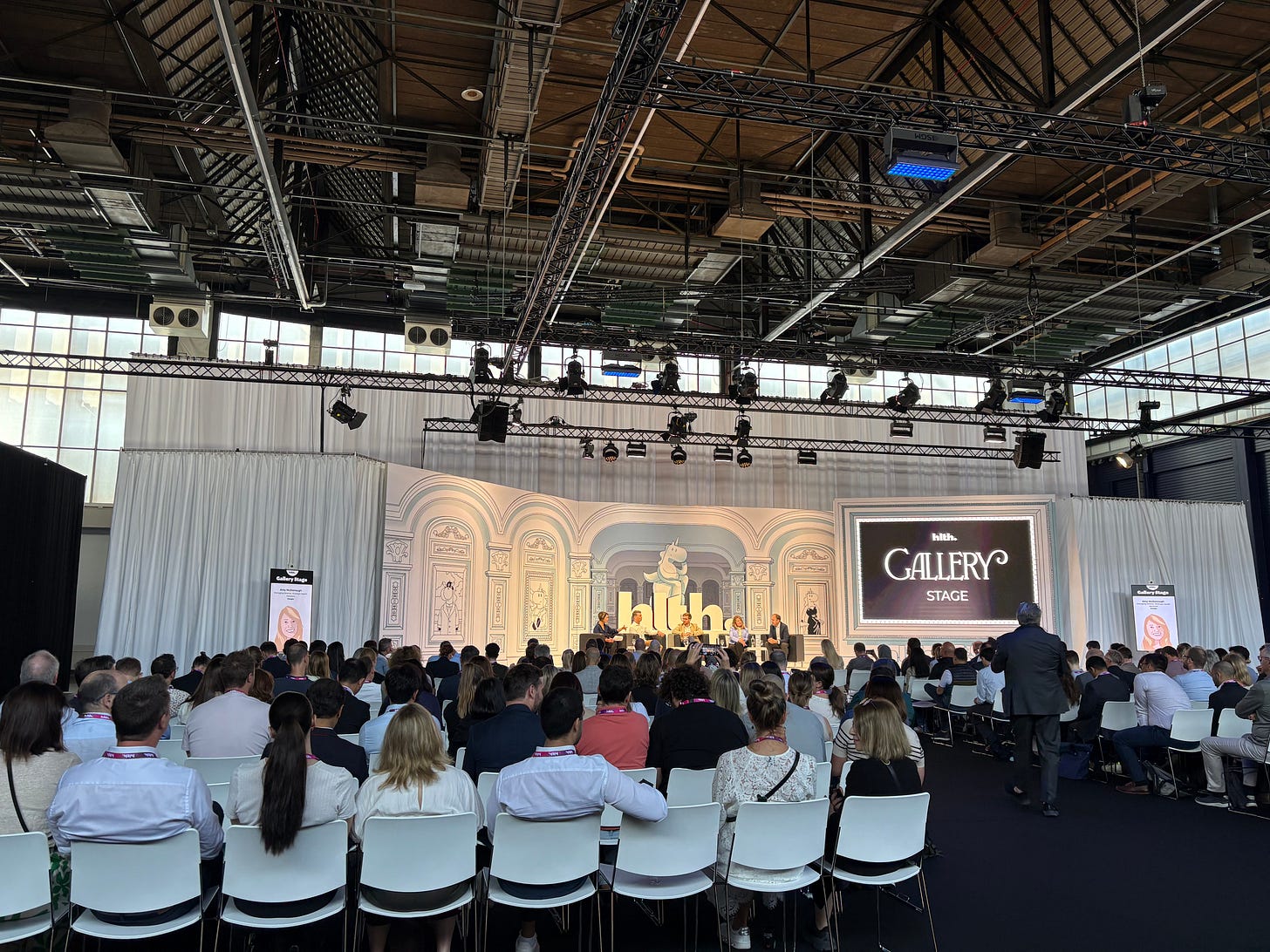We’re excited to be in Amsterdam at HLTH alongside startups, providers and BigTech. The summaries below relate to the consumerisation of health thesis we’ve been writing about & publishing on (i.e. wearables, Oura, and hybrid care delivery).
One thought I’m left with was who wasn’t at the conference. The name missing from the (many!) technology sponsors (including Google, Amazon, Microsoft) was Apple. Given the noise around the AI Doctor rumoured release next year, I’d been looking forward to hearing more from them, but will remain patient!
At the end of Day 1, we’re buzzing to continue and meet more of the ecosystem. Give us a shout if you’d like to meet up!
Snippets from three talks: wearables, behaviour change, and hybrid models of care 🗞️

1. Wearables & digital apps starting to see exciting evidence around behaviour change, but are still not yet adopted by the mass market
Health data is 30% of the world's total data: this presents both a challenge and opportunity (we believe more in the optimistic view of this statistic!). There was a discussion around data quantity vs. quality, trend data vs. point in time data (and how the necessary quality/quantity spectrum changes across this axis), and the actionability of insights.
Digital health & wearables are being adopted at different rates across regions. Initiatives like Singapore's Ministry of Health focusing on cardiometabolic conditions, particularly among those least likely to prioritize their own health, highlights that much of health management occurs outside traditional doctor visits. Germany’s "DiGA" program in Germany aims to streamline market access for digital health tools, ensuring reimbursement.
I hadn’t realised how low Diga adoption was in the context of insured people: the statistic shared was that there are only 60k downloads annually across Diga apps, on a base of 12m insured individuals. This indicates that DiGA, while a valuable addition, is still grappling with user engagement, often due to doctors not prescribing them or patients needing to contact their insurer for download codes.
2. Oura as a case study for the start of mass market behaviour change
It’s our second time seeing the Oura CEO speak in the last six months, and the mission statement remains the same: Oura’s spikes are in sleep and women’s health. This panel was more on Oura’s ventures into metabolic health through partnerships with hybrid care.
The example in metabolic health was that individuals using Oura rings showed a 20% improvement in visit rates for metabolic health compared to those without, provided there was a minimum of 15-20 engagements with the Oura data per quarter (I assume these are in-app nudges).
Beyond metabolic health, the FDA recently cleared Oura's fertile window tracking software last October. Oura is also trialing out Value-Based Care (VBC) in a partnerships with Lumeris in order to have AI-powered primary care (built on wearable data insights). The next piece of the puzzle is influencing reimbursement (some clinical Oura partners give out the ring for free because of the increased engagement & adherence, but I’m not sure at what scale this is deployed).
3. Care modalities: in-person versus digital (… both?)
This is a theme we’re thinking a lot about at Eka. The panel had a mix of more traditional providers (Bupa, Median Group who own The Priory), and investors (Khosla) and debated the provisioning of care across digital and in-person.
We heard how companies like Limbic are streamlining behavioral health intake and how continuous in-home support, even for seniors interacting with voice agents, is becoming more viable as latency issues diminish.
The discussion also touched on the complexities of digital adoption across different regions and patient demographics. While Bupa explores "connected care" to streamline patient journeys, and Median Group notes the significant use of digital tools by their average 55-year-old patient, the panel acknowledged challenges like the preference for personal contact among older German patients versus higher app engagement in Spain.
Ultimately, despite the exciting advancements in areas like genomic testing and AI-driven coaching (which Bupa found very well-received because the increased perception of confidentiality), the core challenge remains engaging people in preventative health and offering choice rather a set ‘offline’ or ‘online’ pathway.
✍🏽 Week in Impact Articles
Monday: We built a solar data center on a farm
Tuesday: AI and the Labor Market
Wednesday: Fervo goes hotter, deeper, faster, cheaper
Thursday: Battle of the Brain Chips
Friday: Your guide to AI: June 2025
🗣️ Review of the Week
👋 Getting in Touch
If you’re looking for funding, you can get in touch here.
Don’t be shy, get in touch on LinkedIn or on our Website 🎉.
We are open to feedback: let us know what more you’d like to hear about 💪.




